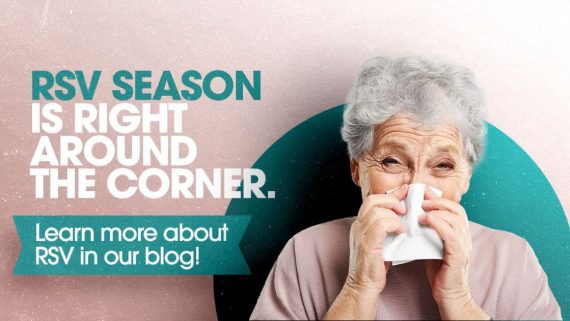Respiratory syncytial virus (RSV) is so common that most children get it before the age of two years. Healthy people usually experience mild, cold-like symptoms and recover within a week or two. However, the RSV virus can have serious effects on older adults, as well. In the U.S. specifically, RSV has caused an estimated 177,000 hospitalizations and 14,000 deaths in people aged 65 and older every year.
Here’s what you need to know to have a better understanding of the virus.
What is RSV?
RSV is a virus that causes respiratory illness which covers the nose, throat, and lungs. It typically mimics a mild cold leading to symptoms, such as:
- Runny nose or congestion
- Dry cough
- Low-grade fever
- Sore throat
- Sneezing
- Headache
In severe cases, the infection can spread to the lower respiratory tract, causing inflammation of the small airway passages entering the lungs. Examples of severe infection symptoms include:
- Fever
- Severe, persistent cough
- Wheezing
- Difficulty breathing
- Bluish color of the skin due to lack of oxygen
Causes and Risk Factors
RSV symptoms usually begin within 4 to 6 days after exposure, and infected individuals are generally contagious for 3 to 8 days. The virus can be transmitted in several ways. For example, it can be spread through the respiratory droplets of an infected person, touching contaminated surfaces with the virus on them, or direct contact, like kissing the face of anyone with RSV.
While people of any age can get RSV, those at the highest risk for severe disease include:
- Premature infants
- Young children with heart or lung diseases
- Adults and young children with compromised immune systems
- Older adults, particularly those with pre-existing heart or lung disease
Prevention and Treatment
To prevent the spread of RSV, experts recommend engaging in health-protective behaviors. These behaviors include proper handwashing, avoiding close contact with others, covering coughs and sneezes, and not sharing personal items. Frequently cleaning toys and surfaces is essential, too.
Most RSV infections resolve on their own in a week or two, and for those who have contracted RSV, there are treatment options available. These options consist of self-care measures to make patients more comfortable, as well as over-the-counter therapies that help clear congestion, reduce fever, and keep people hydrated. However, if severe symptoms persist, you may need hospital care.

Fortunately, researchers are working to develop vaccines and treatments to help fight RSV, as potential new options are currently being evaluated in clinical research studies. If you’re an adult over the age of 60 and are interested in learning about how you can get involved with upcoming RSV studies here at ActivMed Practices & Research, please call us today at (978) 969-6897!
Sources:

